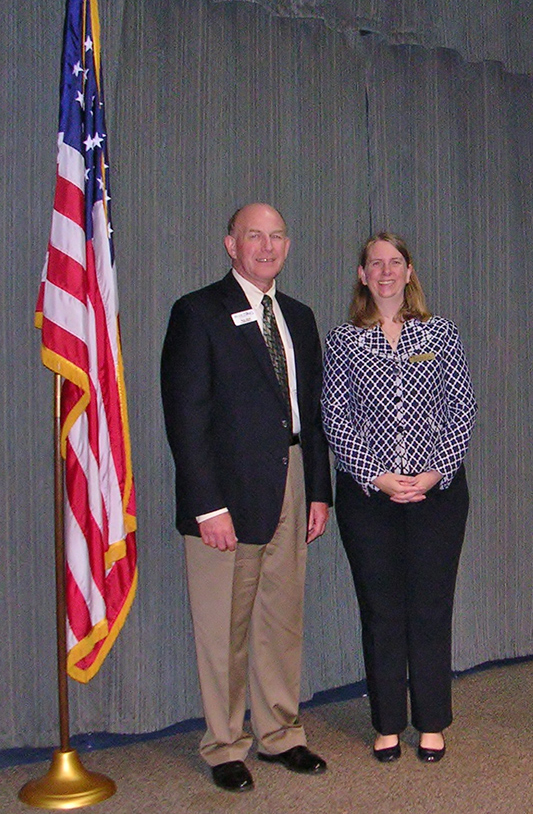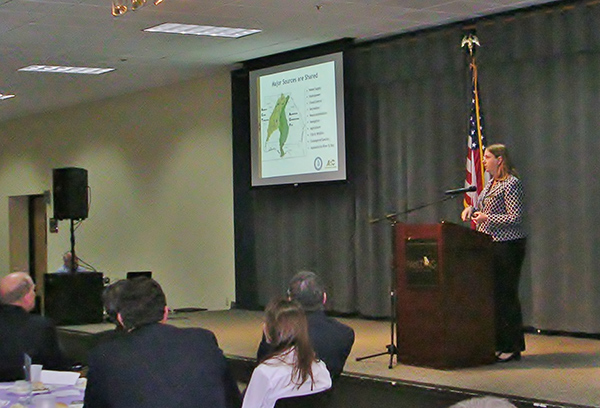 The Paulding Chamber of Commerce hosted Atlanta Regional Commission’s Katherine Zitsch. Ms. Zitsch is a manager of the Natural Resources Division and in that capacity knows a lot about Georgia water, ongoing water litigation with bordering states, and how best to manage that most important of natural resources.
The Paulding Chamber of Commerce hosted Atlanta Regional Commission’s Katherine Zitsch. Ms. Zitsch is a manager of the Natural Resources Division and in that capacity knows a lot about Georgia water, ongoing water litigation with bordering states, and how best to manage that most important of natural resources.
Zitsch has led partnerships with the Georgia Environmental Protection Division, multiple cities and counties, the Georgia Environmental Finance Authority, other stakeholders and several consultants to develop regional water plans for the Altamaha, Coastal Georgia, and Suwannee-Satilla Regional Water Councils.
Since 2013 she’s been responsible for overseeing the Metropolitan North Georgia water planning district. She is well-versed on regional water wars, and she touched on those last week and gave some brief history and background of the Atlanta planning district.
Zitsch told Paulding business leaders last week that most of Atlanta’s water comes from surface water, rather than ground water and that combines with a good bit of rain. The four major lakes are the local water source and are also operated by the army corp of engineers. Two major suits are before the Supreme Court currently, she said. One with Florida versus Georgia accepted by the court in November of 2014 over an equitable portion of water coming out of Apalachicola and Georgia has filed to dismiss the case because control of the water is with the army corp. of engineers.
Also, both Lake Lanier and the Chattahoochee River are being studied by the corp to determine how much water supply can go to metro Atlanta cities and counties from those sources, she said.  Georgia, Alabama and Florida have spent the last five years in reaching an agreement on how to use the Apalachicola basin. Two weeks ago the 56 stake-holders involved in that long process reached an agreement on how best to do that, Zitsch said, and those recommendations have gone to state officials for review.
Georgia, Alabama and Florida have spent the last five years in reaching an agreement on how to use the Apalachicola basin. Two weeks ago the 56 stake-holders involved in that long process reached an agreement on how best to do that, Zitsch said, and those recommendations have gone to state officials for review.
In terms of water struggles with Alabama, Zitsch said that there is very little impact beyond the political overtones. “We have very little impact. Water [tends to be] a surrogate for an economic debate,” she said. And she emphasized that “...we often find that we are fighting an uphill battle from a public perception standpoint, but I can assure you that we are doing all the right things with our water supply, that our water supply is not the cause of the impacts downstream,” she said. Zitsch also mentioned the Richland Creek Reservoir project and said that it a very good project for Paulding and the state.
Zitsch holds a Bachelor of Science degree in Civil Engineering and a Master of Science degree in Environmental Systems Engineering, both from Clemson University. She is a Board Certified Environmental Engineer through the American Academy of Environmental Engineers and a member of the Georgia Association of Water Professionals and the American Society of Civil Engineers.



















